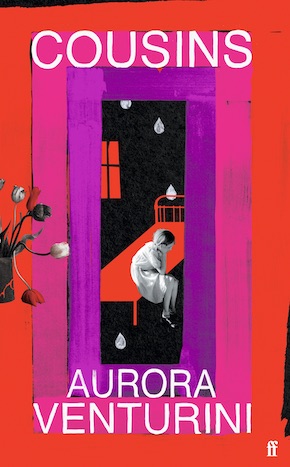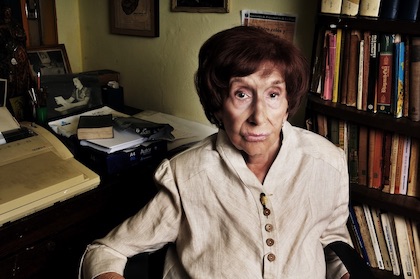About my Aunt Nené
by Aurora Venturini
She spent her life clinging to the skirts of the mother who was also my mother’s mother which is to say mine and Betina’s grandmother. My grandmother’s skirts were like a priest’s cassock and her shoes were sturdy like men’s shoes while her hair was tied up in a black bun because her mother was an Indian and Indians don’t go gray, maybe because they don’t think. Like my grandmother, Mother didn’t have any gray hair but she did think.
Nené played the guitar by ear, when she played she wore a blue-and-white headband, and she hated gringos. My thoughts get away from me when I try to describe her, there are a lot of them and they’re very silly but it would be fair to call her a character.
She liked to date and kiss until she swallowed her boyfriend’s lips and she had about eight hundred of them but still preserved her virginity by leaping out of her wedding bed following a ceremony at the register office and a white church wedding.
Back in the early 1930s Nené fell in love with an Italian carpenter. I remember how handsome the carpenter was… Tall, blond, always clean and wearing cologne. He came to court her at the door of grandmother’s house which wasn’t worth much because it was just a little neighborhood cottage. But because no one in the family worked they had to make do with what Uncle Tito who worked for the newspapers sent them.
Aunt Nené gloried in the kisses she received. But they never did anything else because she wanted to marry in a state of virginity. I didn’t understand. I thought it meant that one could protect oneself from something very sinful that I associated with pregnancy by wearing a medallion of the Virgin. Maybe when you got married you had to take off the medallion so the Virgin didn’t see, who knows what it was that the Lord’s mother wasn’t supposed to see. I had great big messes in my head that I poured out onto my cardboard so I painted a delicate little neck from which hung a necklace with the Virgin of Luján and from out of the shadows I made by rubbing thick black lines with my finger came a big man like the Basque milkman who brought us our milk and was always calling out something like “arrauia” and from the large body fell heavy liquid that swamped the fragile neck and the Virgin wept. To show the weeping I painted red spatters of devastation that scorched the little figure on her lily neck.
The Italian boyfriend finished the bedroom, the bed and the bedside tables with fine wood. Then he made the dining room furniture and other knickknacks that every decent home needs. Aunt Nené, I know this because I listened at the door, laughed at the gringo. Does that wop think I’m going to marry him and eat pasta? Once I said to her: better pasta than just white coffee almost all the time.
She told me that I had to help her get the Italian off her back because she was now sick of him and I said I wouldn’t, I wouldn’t do anything bad. She said that my father who was a gringo too had left mother. I asked her if she wasn’t ashamed of deceiving a good man like that and she said that wops were frauds, they weren’t gentlemen, and that night she went to Chascomús where one of her brothers lived, which is to say one of my uncles and my mother’s brother too.
After that I didn’t hear any more about the entanglement but it was a year before Nené went back to her mother’s house after which she was afraid to leave in case she met the Italian. Fortunately I heard that after his disappointment with Nené he’d engaged in nuptials with a woman from Genoa and the woman was already pregnant and I thought that she must not wear her Virgin medallion because of the contact with her husband that the Virgin mustn’t see or hear.
Soon afterward Aunt Nené began seeing an Argentine boyfriend who came from Córdoba. I liked to hear his singsong accent and painted something about it.
He told stories about his adventures in his far-off homeland and my ears savored the names of places like Paseo de la Infanta, the Manzanares River full of apples dancing in the waves like chubby-cheeked angels.”
The couple sang together and she played the guitar while a friend passed around the maté gourd. It didn’t last long. This gentleman didn’t build furniture or anything. One evening in June – when it gets dark early – he pressed her against a wall and she crowed like a cock at dawn and the nightwatchman on the corner came and peeled off the brazen man – he had to peel him away because he was stuck to my aunt’s body – and took him down to the jail.
It was a brief and scandalous romance. I think she had others but just for looking until Don Sancho appeared and won her. Don Sancho was a Spanish republican who I loved because he looked like Don Quixote de la Mancha.
I had a hardback book with a drawing of the Knight of Rocinante the horse and Sancho Panza but my aunt’s boyfriend didn’t have a belly, he was skinny as a rake and so well-spoken that I always hoped they’d come over the both of them, him and her, to drink tea and eat the cookies he’d brought. I wasn’t interested in the tea and cookies, I wanted to hear Don Sancho’s voice. He told stories about his adventures in his far-off homeland that gave me inspiration for my paintings and my ears savored the names of places like Paseo de la Infanta, the Manzanares River full of apples dancing in the waves like chubby-cheeked angels, which I painted.
Don Sancho gave me a fine porcelain doll that I had to call Nené, the name of my aunt and his beloved. Mother protested that I would be turning fourteen soon, I was too old for dolls. I put it on my bed and we hugged at night.
I understood that my fate loomed gloomy cloudy rainy lonely when mother shook my bedsheets, tossing Nené my doll and smashing away her charms and I came down sick with a trembling that lingered for a long time. After the smashing I grew up. Something shattered inside me hurt. Shards of porcelain
Nené, my doll, stuck into my liver giving me nervous hepatitis, and I learned to cry.
I also cried when Aunt Nené left her husband, who was Don Sancho. One day I asked her why she didn’t do her wifely duty. She answered that she couldn’t discuss intimacies with me because as her niece I owed her respect and there’d be plenty of time later to talk about spicy, dirty things.
I told her that her sister, my other aunt, must do spicy, disgusting things with her husband and she told me to shut my mouth.
from Cousins, translated by Kit Maude (Faber & Faber, £12.99)
—

Aurora Venturini was born in 1922 in La Plata, Buenos Aires. She was an adviser to the Institute of the Child’s Psychology and Re-education, where she met and became intimate friends with Eva Perón. In 1948, Jorge Luis Borges personally handed her the Initiation Award (Premio Iniciación) for her book El solitario. She studied psychology at the University of Paris, where she self-exiled for twenty-five years after the Liberating Revolution in Argentina. In Paris she lived in the company of Violette Leduc and became a friend of Jean-Paul Sartre, Simone de Beauvoir, Albert Camus, Eugène Ionesco and Juliette Gréco. She translated and wrote critical essays on poets such as Isidore Ducasse (Comte de Lautréamont), François Villon and Arthur Rimbaud; for her translations of the latter two authors she received the Iron Cross decoration from the French government. In 2007, she received the Página/12 New Novel Award for Las primas (Cousins). She died on November 24, 2015 in Buenos Aires. Cousins is now published for the first time in English by Faber & Faber.
Read more
Twitter: @FaberBooks
Instagram: faberbooks
Author photo by Claudia Bernaldo de Quirós
Kit Maude is a British literary translator based in Buenos Aires. He has translated dozens of classic and contemporary Latin American writers including Jorge Luis Borges, Armonía Somers, Lolita Copacabana and Ariel Magnus for Granta, the Literary Review, The White Review and The Short Story Project among others, and writes literary criticism for Revista Ñ, Otra Parte and the Times Literary Supplement.
Cover images: Child © Dorothea Lange, Tulips © Charles Spencelayh courtesy of Bridgeman Images. Design by Faber

